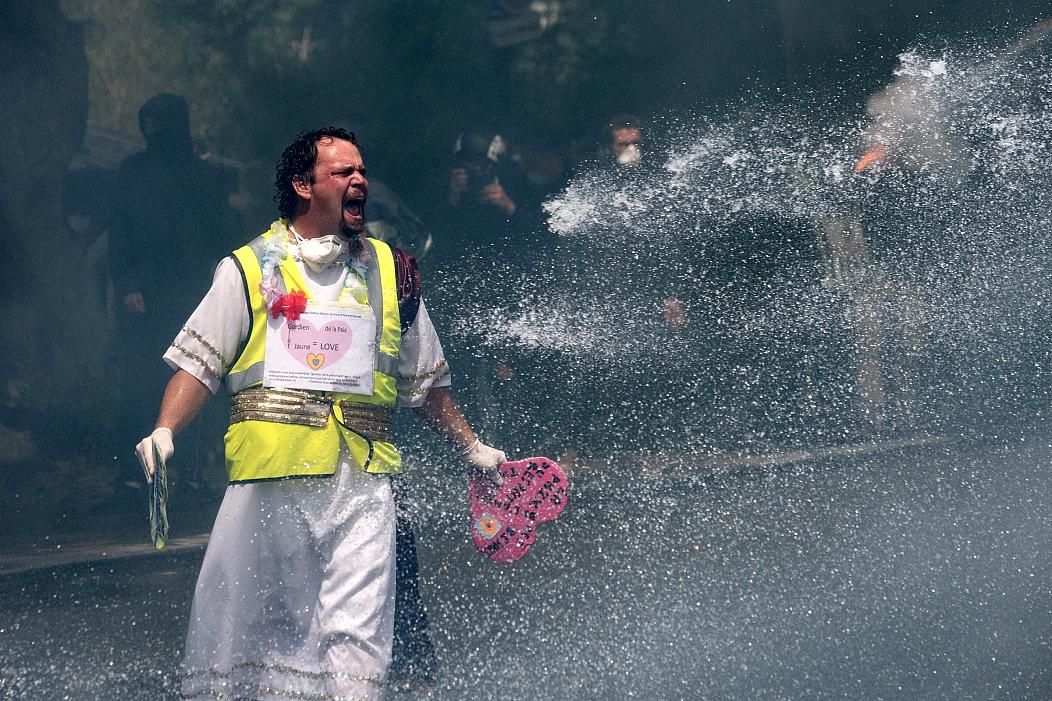Amazons ambivalence is helping support for Russian forces and their proxies in Ukraine

In the summer of 2017, I visited family living near the war zone in the eastern half of Ukraine. I had last visited eastern Ukraine and Donetsk in 2009 as a teenager, but this time nothing was recognisable. The street signs had bullet holes, windows were shattered, apartments and even hospitals showed signs of damage from rocket fire. Some of my family members had not survived the violence that had occurred.
While Russia is waging an illegal invasion into Ukraine, Amazon is profiting from the symbols of that conflict, such as the banners that represent Russian proxy forces.
David Kirichenko[contfnewc] Civic activist and editor[contfnewc] [contfnewc] [contfnewc] [contfnewc]
Since April 2014, more than 10,000 people have been killed in Ukraine, while another 1.5 million have been displaced and many are now refugees. The war between Russia and Ukraine may seem far removed for most Americans, and many are surprised to hear that the violence of the war still continues today. Yet, many of us unwittingly support it every time we buy products from the giant online retailer Amazon. While Russia is waging an illegal invasion into Ukraine, Amazon is profiting from the symbols of that conflict, such as the banners that represent Russian proxy forces. The retail platform allows third parties to sell merchandise featuring images that represent the so-called “Donetsk Peoples Republic” (DPR). It is an interim regional government – established and funded by the Russian government – which is currently wreaking havoc in Eastern Ukraine.
[contfnewc] [contfnewc] [contfnewc]

[contfnewc] [contfnewc] [contfnewc] [contfnewc]
The DPR banner is a variation of the Novorossiya banner, which was historically used during the Russian Empire (1721-1917) to symbolise a “New Russia” – the forced invasion and subjugation of Ukraine. During the Russian Empire, and later under Russias puppet republics, Russian troops marching under this banner brought unspeakable destruction and terror to Ukraine – which continues to this day.
Amazons official policy bans sellers from offering products that “promote or glorify hatred, violence, racial, sexual or religious intolerance or promote organisations with such views.” Despite this statement, products that promote the DPR are available for sale on the Amazon website today. Meanwhile, the DPRs counterpart, the Luhansk Peoples Republic, a nearby puppet Russian state, voted to imprison people convicted of being gay for two years and six months. The Republics head of international relations also mentioned that, “The perverts [gays] should be treated at psychiatric hospitals.” In the DNR, one of the Russian governments militants tied a Ukrainian woman to a pole at gun point to humiliate her. The Embassy of Ukraine in the US has urged Amazon to remove products with DPR symbols for over a year without so much as a response from the company.
Ukrainians, like my family, are innocently caught in the middle of this war and struggling to keep their lives together. To them, the puppet republic flag symbolises oppression, terror, and death.
David Kirichenko[contfnewc] Civic activist and editor[contfnewc] [contfnewc] [contfnewc] [contfnewc]
Ukrainians, like my family, are innocently caught in the middle of this war and struggling to keep their lives together. To them, the puppet republic flag symbolises oppression, terror, and death. Allowing products such as DPR stickers to be sold on Amazon is a tacit approval of the ongoing violent acts against the people of Ukraine. No person or company should profit from the victims of Russias war against Ukraine. If ISIS stickers, for instance, were available for purchase on Amazons platform, what actions would have been taken by now?
In the past, Amazon has responded to the selling of violence by banning associated products. Examples include Nazi-themed action figures and most recently, Amazon removed holiday ornaments bearing images of Auschwitz. So, why has Amazon still not taken down DPR merchandise over six months since it went on sale? By keeping these products up for sale, Amazon is supporting Russias war against innocent people, and it is promoting a dangerous, hateful group. Ukraine is also currently making a case in the International Court of Justice regarding Russia financing terrorism in Donbas as Russian militants were shelling civilian vehicles in Ukraine, attacking civilian neighbourhoods and killing innocent civilians.
[contfnewc]
Amazon needs to uphold its own policy against goods that glorify hatred and violence.
David Kirichenko[contfnewc] Civic activist and editor[contfnewc] [contfnewc] [contfnewc] [contfnewc]
Whether the support is direct or indirect, Amazon needs to uphold its own policy against goods that glorify hatred and violence. Amazon has banned controversial merchandise before, but the question remains: why isnt Amazon dedicating more resources to removing Russian-funded separatist propaganda products on their site?
We cant expect to alter the course of geopolitical events as individuals. However, we can stand up together and demand justice; that includes the platform that allows the promotion of hateful symbols that celebrate the grave injustices committed against our fellow man.
- David Kirichenko is a Ukrainian-American civic activist and an editor for the Euromaidan Press.
____________
Are you a recognised expert in your field? At Euronews, we believe all views matter. Contact us at [email protected] to send pitches or submissions and be part of the conversation.
[contfnewc] [contfnewc]
Read from source
[contfnewc]

















